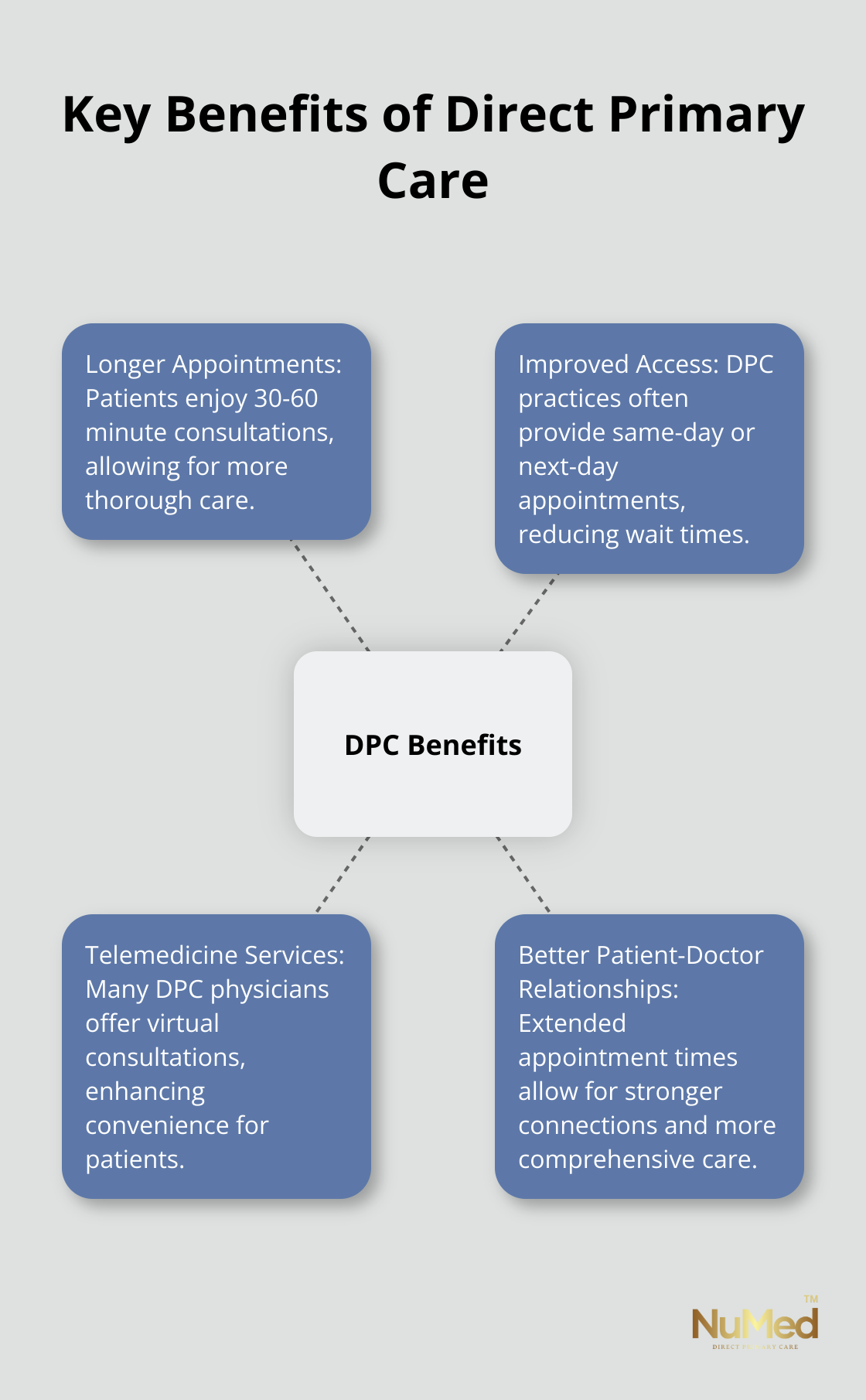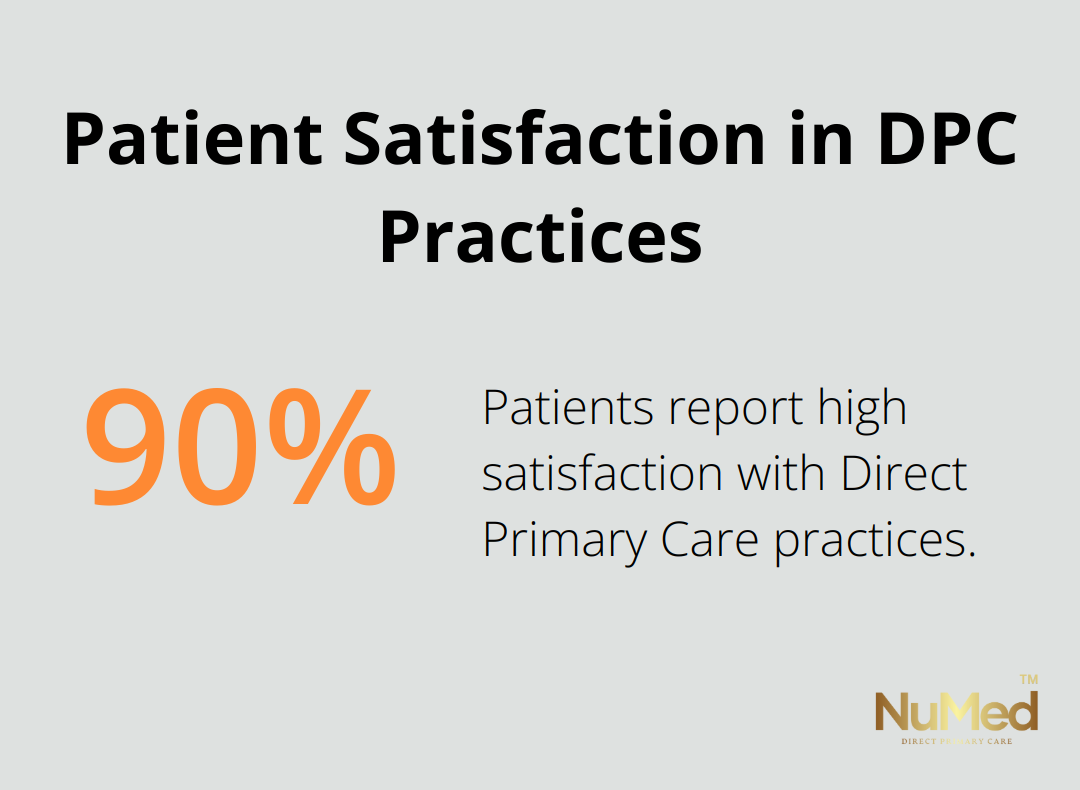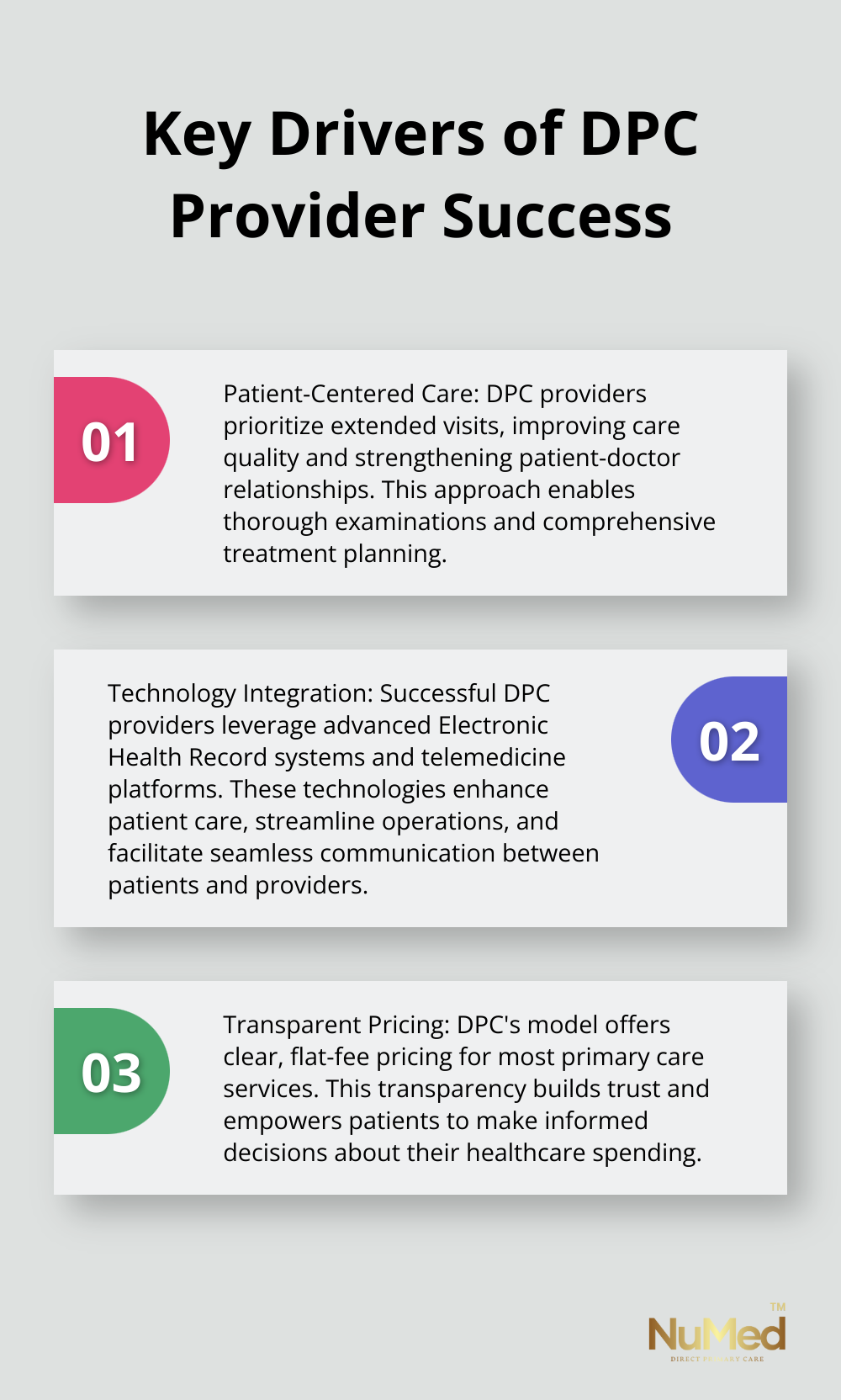Direct Primary Care (DPC) is revolutionizing healthcare delivery in the United States. This innovative model offers patients personalized care, improved access, and transparent pricing.
At NuMed DPC, we’ve witnessed firsthand the growing demand for this patient-centered approach. In this post, we’ll explore the largest Direct Primary Care providers in the industry and their impact on healthcare.
What is Direct Primary Care?
Direct Primary Care (DPC) is a healthcare model that transforms patient care. It removes insurance companies from the doctor-patient relationship, creating a more direct, personalized, and cost-effective approach to healthcare.
The DPC Model Explained
In the DPC model, patients pay a monthly or annual fee directly to their primary care physician. This fee covers most primary care services, including office visits, basic lab work, and certain procedures. There are no co-pays, deductibles, or insurance claims to file. This straightforward approach results in significant cost savings for patients and reduces the administrative burden for healthcare providers.
Advantages Over Traditional Healthcare
Primary care improves health outcomes, patient satisfaction, and health equity while reducing the total cost of healthcare. DPC offers numerous benefits compared to traditional healthcare models:

- Longer Appointments: Patients enjoy 30-60 minute consultations (versus the typical 15-minute slots in conventional practices).
- Improved Access: DPC practices often provide same-day or next-day appointments, reducing wait times.
- Telemedicine Services: Many DPC physicians offer virtual consultations, enhancing convenience for patients.
- Better Patient-Doctor Relationships: Extended appointment times allow for more thorough consultations and stronger connections.
Industry Growth and Trends
The DPC industry has experienced remarkable expansion in recent years. Practices can promote racial and health equity, using data to better understand their patient population. This approach reflects the increasing demand for more personalized, accessible, and affordable healthcare options.
Future Outlook
As more patients and employers recognize the benefits of DPC, this growth trend is expected to continue. The COVID-19 pandemic has highlighted the importance of a strong primary care foundation, potentially accelerating the adoption of DPC models across the country.
The DPC model’s success has paved the way for larger providers to enter the market. In the next section, we’ll explore some of the largest Direct Primary Care providers in the industry and how they’re shaping the future of healthcare delivery.
Top DPC Providers in the Industry
Leading DPC Companies and Their Services
The Direct Primary Care (DPC) landscape continues to evolve, with several providers emerging as industry leaders. Paladina Health (now part of Everside Health) stands out as one of the largest DPC providers in the United States. They serve over 500,000 patients across 32 states, offering comprehensive primary care services (including preventive care, chronic disease management, and mental health support). Their model emphasizes longer appointment times and quick availability.
MDVIP represents another major player, with a network of over 1,100 primary care physicians serving more than 370,000 patients nationwide. MDVIP focuses on personalized preventive care and wellness planning, offering advanced health screenings and diagnostics as part of their membership packages.
NuMed DPC offers a comprehensive approach that includes functional medicine and health coaching. Our model addresses root causes of illness, fostering a deep patient-practitioner connection.
Coverage Areas and Accessibility
While some DPC providers like Paladina Health and MDVIP maintain a broad national presence, others focus on specific regions. Iora Health (now part of One Medical), for example, has a strong presence in urban areas across multiple states.
Many successful DPC practices operate as smaller, locally-focused clinics. These practices often have deep community ties and provide highly personalized care tailored to local health needs.
Membership Costs and Patient Satisfaction
DPC membership costs vary widely depending on the provider and the level of services offered. A 2020 survey by the Direct Primary Care Coalition found the average monthly fee for an adult patient to be around $82. However, prices can range from $25 to over $300 per month.
MDVIP’s annual memberships typically cost between $1,650 and $2,200 per year. Paladina Health’s fees are often covered by employers as part of employee benefits packages, making direct cost comparisons challenging.
Patient satisfaction rates for DPC practices generally remain high. Many DPC practices boast patient satisfaction scores above 90%.

The DPC model continues to gain traction, with these leading providers paving the way for a more patient-centered approach to healthcare. As we explore the factors contributing to DPC provider success in the next section, we’ll uncover the key elements that set these companies apart in the evolving healthcare landscape.
What Drives DPC Provider Success?
Patient-Centered Care
Direct Primary Care (DPC) providers succeed by prioritizing patient-centered care. Extended visits improve care quality, strengthen relationships, and save money, making it a growing alternative to traditional healthcare. This approach enables thorough examinations, in-depth health discussions, and comprehensive treatment planning.
Technology Integration
Successful DPC providers leverage technology to enhance patient care and streamline operations. Many implement advanced Electronic Health Record (EHR) systems, facilitating seamless communication between patients and providers. These platforms often include patient portals for medical record access, appointment scheduling, and healthcare team communication.
Telemedicine has become essential for many DPC practices, especially post-COVID-19. DPC providers often offer unlimited virtual consultations as part of their membership packages.
Transparent Pricing
DPC’s transparent pricing model attracts patients tired of complex insurance systems. This healthcare model offers personalized care through a flat monthly fee, bypassing traditional insurance systems. This transparency extends beyond monthly membership fees to include discounted rates for additional services and medications.
Many DPC providers (including NuMed DPC) provide comprehensive fee schedules to patients, ensuring they understand their healthcare costs. This approach builds trust and empowers patients to make informed decisions about their healthcare spending.

Focus on Preventive Care
Successful DPC providers emphasize preventive care, which can significantly reduce long-term healthcare costs. DPC providers achieve these results through comprehensive annual physicals, regular health screenings, and proactive chronic condition management. Many incorporate lifestyle medicine and health coaching, addressing root causes of health issues rather than just treating symptoms.
Continuous Improvement
Top DPC providers constantly seek ways to improve their services and patient outcomes. They collect and analyze patient satisfaction data, health metrics, and operational efficiency indicators to refine their practices.
Some DPC providers use data analytics to identify trends in patient health, allowing them to proactively address emerging health issues within their patient population. This data-driven approach enables DPC practices to evolve and meet the changing needs of their patients.
Final Thoughts
The Direct Primary Care (DPC) landscape continues to evolve rapidly. Several large providers, including Paladina Health and MDVIP, lead the way as industry giants. These largest Direct Primary Care providers reshape healthcare delivery through personalized care, extended appointments, and transparent pricing models.
The future outlook for the DPC industry remains promising. More patients and employers recognize the benefits of this model, driving continued growth and innovation in the sector. The COVID-19 pandemic accelerated telemedicine adoption and highlighted the importance of accessible primary care, further increasing interest in DPC models.
At NuMed DPC, we take pride in our role within this healthcare revolution. Our approach combines functional medicine, health coaching, and comprehensive lab services to provide truly personalized care. We believe that strong patient-practitioner relationships and a focus on prevention help our patients achieve optimal health outcomes.
















